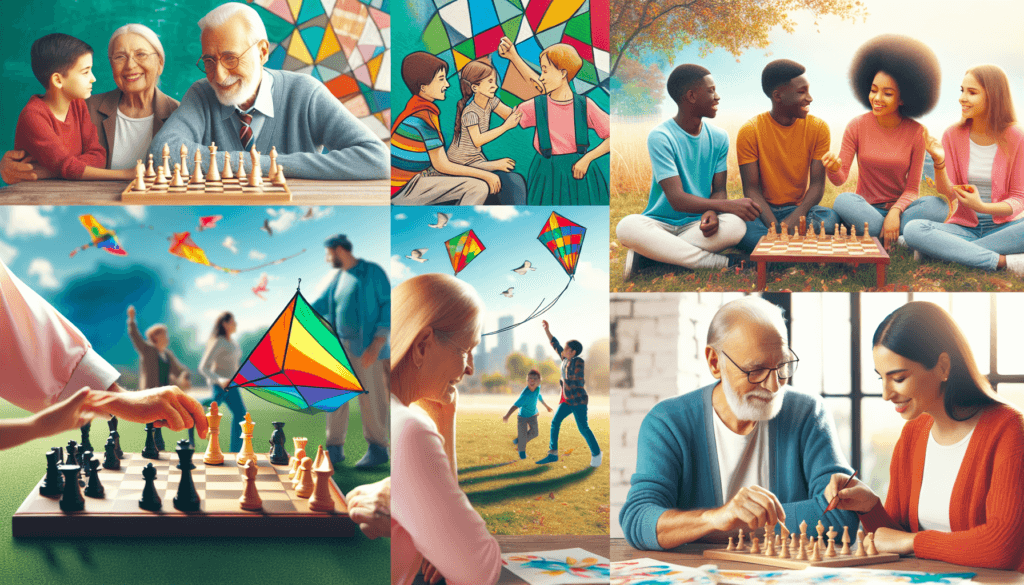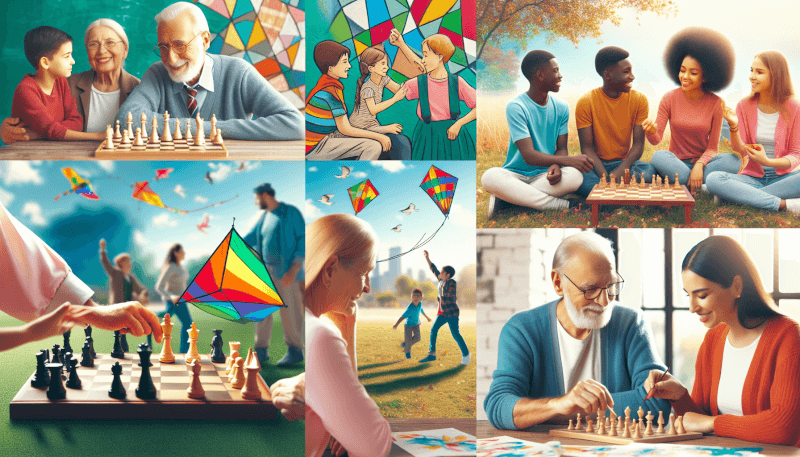As you grow older, staying socially active and engaged becomes increasingly important for your overall well-being and happiness. Research has shown that maintaining strong social connections can have a positive impact on your cognitive function, physical health, and emotional resilience. By participating in social activities, such as joining clubs or groups, volunteering, or regularly connecting with family and friends, you can enhance your quality of life and reduce the risks of isolation and loneliness. Embrace the power of staying socially active and reap the numerous benefits it brings as you age.
Benefits of Social Engagement
Improved Mental Health
Staying socially engaged as you age has numerous benefits for your mental health. Regular social interactions have been shown to improve mood and overall psychological well-being. Engaging in conversations and connecting with others can help alleviate feelings of loneliness and reduce the risk of developing depression and anxiety. Social activities provide a sense of purpose and belonging, which can contribute to a more positive outlook on life.
Reduced Risk of Cognitive Decline
Maintaining an active social life can also have a significant impact on cognitive health. Research suggests that social engagement is associated with a lower risk of cognitive decline and can even help delay the onset of conditions like dementia and Alzheimer’s disease. Engaging in stimulating conversations, participating in group activities, and challenging your brain through social interactions can enhance memory, learning, and problem-solving skills.
Increased Emotional Well-being
Social engagement is closely linked to emotional well-being. Regular social interactions provide opportunities for emotional support, empathy, and understanding. Connecting with others and sharing experiences can help alleviate stress, improve self-esteem, and boost overall happiness. Being part of a supportive social network can provide a sense of belonging and enhance your emotional resilience, helping you navigate life’s challenges with greater ease.
Enhanced Immune System
Believe it or not, being socially engaged can also benefit your physical health. Studies have shown that maintaining social connections can boost your immune system, making you more resistant to illnesses and infections. Regular social interactions can reduce stress levels and lower inflammation in the body, both of which have a positive impact on the immune system. By staying socially active, you are not only improving your mental well-being but also supporting your overall physical health.
Improved Physical Health
Engaging in social activities can have a direct impact on your physical health as well. Socially active individuals tend to lead more active lifestyles, participating in group exercises, outdoor activities, and recreational sports. Regular physical activity, combined with the social element, can lead to improved cardiovascular health, increased strength and flexibility, and enhanced mobility and balance. Additionally, being socially active can help regulate sleep patterns and reduce the risk of developing chronic diseases such as diabetes, obesity, and heart disease. By staying socially engaged, you are taking proactive steps toward maintaining a healthier, more active lifestyle.
Ways to Stay Socially Active
Join a Community or Social Group
One of the most effective ways to stay socially engaged is to join a community or social group that aligns with your interests and hobbies. Whether it’s a book club, a gardening group, or a sports team, being part of a community allows you to connect with like-minded individuals who share your passions. These groups often organize regular meetings or events, providing you with ample opportunities to engage in meaningful conversations and build lasting friendships.
Volunteer for a Cause
Volunteering is not only a great way to give back to your community but also an excellent way to stay socially active. By dedicating your time and skills to a cause you care about, you can meet other compassionate individuals with whom you share common values. Whether it’s assisting at a local food bank, helping out at an animal shelter, or volunteering for a charity organization, volunteering can provide you with a sense of purpose while allowing you to connect with others who are passionate about making a difference.
Take Part in Group Activities
Group activities offer a fantastic opportunity to stay socially engaged while enjoying shared interests. Consider joining a local fitness class, dance group, or art workshop. These activities not only promote physical and mental well-being but also provide a platform for socializing and meeting new people. Engaging in activities with others fosters a sense of camaraderie and can lead to the formation of lifelong friendships.
Reconnect with Old Friends
As you age, it’s common for relationships to fade due to various reasons such as distance, busy schedules, or life circumstances. However, making an effort to reconnect with old friends can be incredibly rewarding and help reignite those connections. Reach out to old classmates, colleagues, or neighbors and organize a get-together or catch-up conversation. Reconnecting with familiar faces can bring back cherished memories and create new opportunities for social engagement.
Attend Social Events and Gatherings
Keep an eye out for social events and gatherings happening in your community. Whether it’s a local festival, a community picnic, or a neighborhood block party, attending these events can provide you with a platform to meet new people and socialize. Engaging with people from diverse backgrounds and experiences can broaden your perspectives and enrich your social interactions. Make it a habit to actively seek out and participate in events that align with your interests.

Maintaining Relationships with Family and Friends
Regular Communication
Maintaining open lines of communication with your family and friends is crucial for nurturing healthy relationships. Make an effort to regularly reach out through phone calls, video chats, or even handwritten letters. Sharing updates, discussing common interests, or simply listening to each other can help foster a strong bond and ensure that you stay connected even if distance separates you.
Plan Regular Get-Togethers
Physical proximity shouldn’t be a barrier to spending quality time with loved ones. Plan regular get-togethers, whether it’s a family dinner, a movie night with friends, or a weekend outing. Establishing a routine for gathering allows you to create lasting memories and strengthens the sense of togetherness. Take turns hosting events or explore new places together to keep things exciting and fresh.
Celebrate Milestones Together
Make it a point to celebrate milestones and special occasions together with your family and friends. Birthdays, anniversaries, graduations, and other significant events provide an excellent opportunity to come together and create cherished memories. Whether it’s organizing a surprise party, attending a graduation ceremony, or planning a special dinner, celebrating these milestones reinforces the importance of relationships and shows your loved ones that you value and care about them.
Travel and Explore Together
Exploring new places and embarking on adventures with your family and friends can be incredibly rewarding. Plan vacations or weekend getaways that allow you to spend quality time together, discover new cultures, and create shared experiences. Traveling together fosters a sense of camaraderie and strengthens bonds, leaving you with lasting memories. Whether you’re exploring a new city, hiking through nature, or relaxing on a beach, traveling enhances your relationships and creates opportunities for meaningful connections.
Provide Emotional Support
Being emotionally available for your loved ones is an integral part of maintaining healthy relationships. Offer support, empathy, and a listening ear when they need someone to talk to. Be present during challenging times and offer encouragement and comfort. By providing emotional support, you not only strengthen your connections but also create a safe and nurturing environment for your loved ones to lean on during difficult moments.
The Role of Technology in Social Engagement
Use of Social Media
Social media platforms like Facebook, Instagram, and Twitter have revolutionized the way we connect and stay in touch with one another. These platforms provide an avenue for sharing updates, photos, and memories with family and friends, regardless of geographical distance. Engaging with social media allows you to stay connected with loved ones, participate in online communities, and discover shared interests. However, it’s important to strike a balance and not let social media replace face-to-face interactions.
Utilizing Video Conferencing
Video conferencing platforms such as Zoom and Skype have become invaluable tools for maintaining social connections, especially during times when in-person interactions may not be possible. These platforms enable face-to-face communication and allow for non-verbal cues, making conversations feel more personal and intimate. Utilizing video conferencing can help overcome distance barriers and facilitate meaningful interactions with loved ones who may be far away.
Join Online Forums and Communities
Online forums and communities offer a wealth of opportunities for social engagement. Whether it’s a discussion group focused on a specific hobby, a support group for a particular interest, or a forum dedicated to a shared passion, joining these online communities can help you connect with like-minded individuals from around the world. Engage in conversations, share experiences, and learn from others who share your interests.
Take Advantage of Online Learning Opportunities
The internet provides a vast array of online learning platforms that allow you to expand your knowledge and skills. Taking advantage of these opportunities not only stimulates your mind but also opens doors to new connections and social engagement. Participate in online courses, webinars, or virtual conferences related to your interests. Connect with fellow learners, ask questions, and engage in discussions to foster a sense of belonging within these virtual learning communities.
Engage in Virtual Games and Activities
Virtual games and activities can provide a fun and interactive way to socialize, especially when in-person gatherings are not possible. Join online gaming communities or participate in multiplayer games that involve teamwork and communication. Virtual game nights, trivia quizzes, or even online cooking challenges can be a great way to connect with friends and family, fostering laughter and friendly competition.

Overcoming Barriers to Social Engagement
Health Limitations
Health limitations can sometimes pose challenges to social engagement, especially for seniors. However, there are still ways to stay socially active despite these limitations. Explore activities that accommodate your specific health needs, such as low-impact exercises or seated group classes. Seek out supportive communities or organizations that cater to individuals with similar health challenges. Additionally, consider utilizing mobility aids or transportation services to help overcome physical barriers.
Transportation Issues
Limited access to transportation can be a significant barrier to staying socially engaged. However, there are various solutions to overcome this challenge. Look into local senior transportation services or community transport programs that provide rides to social events or activities. Carpooling with friends or family members can also be a convenient option. Additionally, consider exploring online or virtual social engagement opportunities where transportation is not required.
Fear or Anxiety
Feelings of fear or anxiety can sometimes discourage individuals from engaging in social interactions. It’s important to remember that these emotions are normal and can be overcome with time and practice. Gradually expose yourself to social situations that make you uncomfortable, starting with small, low-pressure gatherings. Seek support from friends, family, or professionals who can help you work through these emotions. Remember that taking small steps towards social engagement can lead to increased confidence and enjoyment of social interactions.
Lack of Access to Social Opportunities
Some individuals may face limited access to social opportunities due to their living environment or geographical location. However, there are still ways to overcome these barriers. Explore online communities and forums that cater to your interests, allowing you to connect with like-minded individuals regardless of physical distance. Reach out to local community centers, libraries, or churches to inquire about social programs or activities available in your area. Engage in online learning platforms that offer virtual classes or workshops on various topics.
Financial Constraints
Financial constraints can sometimes limit the ability to engage in social activities that require resources or admission fees. However, there are plenty of low-cost or free social engagement options available. Look for community centers, libraries, or local organizations that offer free or affordable programs and events. Take advantage of parks, nature trails, or public spaces that provide opportunities for socializing without any cost. Additionally, consider volunteering for local initiatives or organizations, which not only allows for social engagement but also provides a sense of fulfillment and purpose.
Creating Social Connections in Senior Living Communities
Participate in Community Events
Senior living communities often organize a variety of events and activities specifically tailored to residents. These events provide a fantastic opportunity to socialize and connect with fellow residents. From group outings to movie nights to themed parties, participating in community events encourages a sense of belonging and fosters camaraderie among residents. Take advantage of these opportunities to meet new people and build meaningful relationships within your senior living community.
Engage in Shared Activities
Engaging in shared activities within senior living communities promotes social connections and helps create a supportive network of friends. Participate in group exercises, arts and crafts sessions, or game nights. Collaborate with others to organize regular book clubs or discussion groups. By actively involving yourself in these shared activities, you’ll have the chance to meet like-minded individuals and form bonds based on common interests.
Join Clubs or Interest-Based Groups
Many senior living communities offer a range of clubs or interest-based groups. Whether it’s a gardening club, a writing group, or a music ensemble, joining these clubs allows you to connect with individuals who share your hobbies and passions. These clubs often organize regular meetings or workshops, providing a platform for social engagement and the opportunity to form lasting friendships with fellow enthusiasts.
Attend Educational Seminars and Workshops
Senior living communities frequently organize educational seminars and workshops on a variety of topics. Take advantage of these opportunities to expand your knowledge while connecting with others who have similar interests. Engage in discussions, ask questions, and share your insights. Educational events create a stimulating environment for both learning and socializing, fostering a sense of intellectual engagement and camaraderie among participants.
Build Relationships with Staff and Residents
The staff members in senior living communities play a crucial role in fostering a sense of community and social engagement. Take the time to build relationships with the staff and appreciate their efforts in creating a welcoming environment. They can provide valuable support, guidance, and information regarding social activities and events within the community. Additionally, make an effort to get to know your fellow residents. Strike up conversations, join communal meals, or organize get-togethers to deepen your connections and create a vibrant social network within your senior living community.

Importance of Social Engagement for Mental Health
Prevention of Depression and Anxiety
Regular social engagement has been shown to prevent and alleviate symptoms of depression and anxiety. Social interactions provide emotional support, companionship, and a sense of belonging, which are essential for maintaining mental well-being. Conversations and connections with others help reduce feelings of loneliness and isolation, creating a supportive network that can contribute to improved overall mental health.
Boosting Cognitive Function
Social engagement plays a significant role in maintaining cognitive function and mental sharpness as we age. Being socially active stimulates the brain, challenging memory, and problem-solving abilities. Engaging in conversations, participating in group activities, and staying mentally active through social interactions can help enhance cognitive function and promote lifelong learning.
Reducing Loneliness and Isolation
Loneliness and social isolation can have detrimental effects on mental health. Regular social engagement helps combat these feelings by providing a sense of connection and belonging. Through social interactions, individuals feel valued, understood, and supported. By staying socially active, you are actively combating loneliness and isolation, improving your overall mental well-being.
Improving Self-esteem and Confidence
Engaging in social activities can boost self-esteem and confidence, particularly when positive interactions and feedback are received. Social engagement provides opportunities for personal growth, allows individuals to share their knowledge and experiences, and helps develop a sense of identity. Feeling valued and appreciated by others can significantly contribute to higher self-esteem and increased confidence in one’s abilities.
Promoting Sense of Purpose and Meaning
Social engagement provides individuals with a sense of purpose and meaning in life. Connecting with others and participating in social activities gives a sense of belonging and importance. By engaging in relationships and contributing to the lives of others, individuals feel a sense of personal fulfillment and a deeper connection to the world around them.
The Role of Social Engagement in Physical Health
Reduction of Stress and Blood Pressure
Social engagement plays a crucial role in stress reduction. Engaging in conversations, sharing experiences, and receiving emotional support from others can help lower cortisol levels, leading to decreased stress and anxiety. Additionally, maintaining social connections has been shown to lower blood pressure levels, reducing the risk of heart disease and other cardiovascular conditions.
Lower Risk of Chronic Diseases
Staying socially active can contribute to better overall physical health and a lower risk of developing chronic diseases. Socially engaged individuals are more likely to lead healthy lifestyles, participate in physical activities, and prioritize self-care. These lifestyle choices, combined with the emotional support and encouragement from social connections, lead to lower rates of chronic diseases such as diabetes, obesity, and heart disease.
Improvement in Sleep Quality
Sleep quality is closely linked to social engagement. Loneliness and social isolation can disrupt sleep patterns and lead to sleep disturbances. Engaging in social activities and maintaining meaningful relationships can help regulate sleep-wake cycles and improve sleep quality. The emotional support and sense of security provided by social connections contribute to a more peaceful and restorative sleep.
Enhancement of Mobility and Balance
Social engagement often involves participating in physical activities, which can enhance mobility and balance in older adults. Group exercises, recreational sports, and even regular walks with friends can contribute to improved muscle strength, coordination, and flexibility. Being physically active within a social setting not only benefits physical health but also enhances the overall social experience.
Strengthening of the Immune System
The power of social engagement extends to the immune system. Studies have shown that individuals who maintain social connections have stronger immune systems, making them more resilient to infections and diseases. Positive social interactions and emotional support have been linked to improved immune function, reduced inflammation, and a faster recovery from illness. By staying socially engaged, you are actively boosting your immune system and supporting your overall well-being.

Social Engagement and Cognitive Abilities
Brain Stimulation and Neuroplasticity
Social engagement provides ongoing stimulation to the brain, promoting neuroplasticity and cognitive function. Engaging in conversations, actively listening, and participating in social activities challenge the brain, strengthening neural connections and promoting the growth of new neurons. This brain stimulation is crucial for maintaining cognitive abilities as we age.
Enhancing Memory and Learning
Regular social interaction has been shown to enhance memory and learning abilities. Engaging in conversations, discussing topics of interest, and recalling past experiences help exercise memory and keep the mind sharp. Additionally, absorbing new information through social interactions and participating in group activities promote continuous learning and the acquisition of new skills.
Delaying the Onset of Cognitive Decline
Staying socially active has a protective effect on cognitive function, potentially delaying the onset of cognitive decline. Engaging in stimulating conversations, challenging activities, and maintaining social connections stimulate the brain and help maintain cognitive abilities over time. By staying socially engaged, you are actively contributing to the preservation of your cognitive health and reducing the risk of conditions such as dementia and Alzheimer’s disease.
Lowering Risk of Dementia and Alzheimer’s
Research has shown a correlation between social engagement and a reduced risk of developing dementia and Alzheimer’s disease. Socially active individuals tend to have lower rates of cognitive decline and a decreased risk of these debilitating conditions. By maintaining social connections, participating in social activities, and engaging in stimulating conversations, individuals can potentially protect their brain health and reduce the risk of developing dementia and Alzheimer’s.
Improvement in Problem-solving Skills
Social engagement also benefits problem-solving and decision-making skills. Engaging in group activities, discussions, or collaborative projects requires individuals to think critically, exchange ideas, and work together to find solutions. These social interactions promote the development of problem-solving skills, fostering a more agile and adaptable mindset when faced with challenges in daily life.
Maintaining a Socially Active Lifestyle Outside of Retirement
Exercise Regularly
Regular exercise is not only vital for physical health but also plays a significant role in maintaining a socially active lifestyle. Joining exercise classes, attending fitness groups, or participating in recreational sports provide opportunities to socialize with like-minded individuals while prioritizing your physical well-being. Engaging in physical activities within a social setting combines the benefits of both social engagement and regular exercise.
Join Community Programs and Classes
Communities often offer a wide range of programs and classes that cater to various interests and hobbies. Take advantage of these opportunities to learn something new, meet new people, and expand your social circle. Whether it’s attending art workshops, joining language classes, or participating in cooking courses, community programs provide a supportive and inclusive environment for social engagement.
Participate in Social Activities in the Neighborhood
Your neighborhood can be a hub of social activities and gatherings. Stay informed about local events, festivals, or community initiatives happening in your area. Participate in these events, engage with your neighbors, and contribute to the overall sense of community. Establishing connections with neighbors creates a social support system and fosters a sense of belonging within your neighborhood.
Engage in Hobbies and Interests
Pursuing hobbies and interests is not only fulfilling but can also lead to social connections. Whether it’s joining a painting club, attending book signings, or participating in a photography workshop, engaging in activities related to your passions allows you to meet individuals with similar interests. These shared interests provide a natural foundation for conversations and can lead to the formation of meaningful relationships.
Volunteer for Local Initiatives and Organizations
Volunteering is an excellent way to give back to your community while staying socially active. Look for local initiatives, charities, or organizations that align with your values and interests. By dedicating your time and skills to a noble cause, you not only contribute to something meaningful but also connect with other volunteers who share your passion. Volunteering fosters a sense of purpose, improves mental well-being, and creates social opportunities in various settings.
In conclusion, staying socially active and engaged as you age has numerous benefits for mental, emotional, and physical well-being. By participating in social activities, maintaining relationships with family and friends, leveraging technology, and overcoming barriers, you can enhance your overall quality of life. Social engagement promotes a sense of belonging, provides emotional support, and contributes to a healthier, more fulfilling lifestyle. It is never too late to prioritize social connections and experience the powerful impact they can have on your overall well-being.



